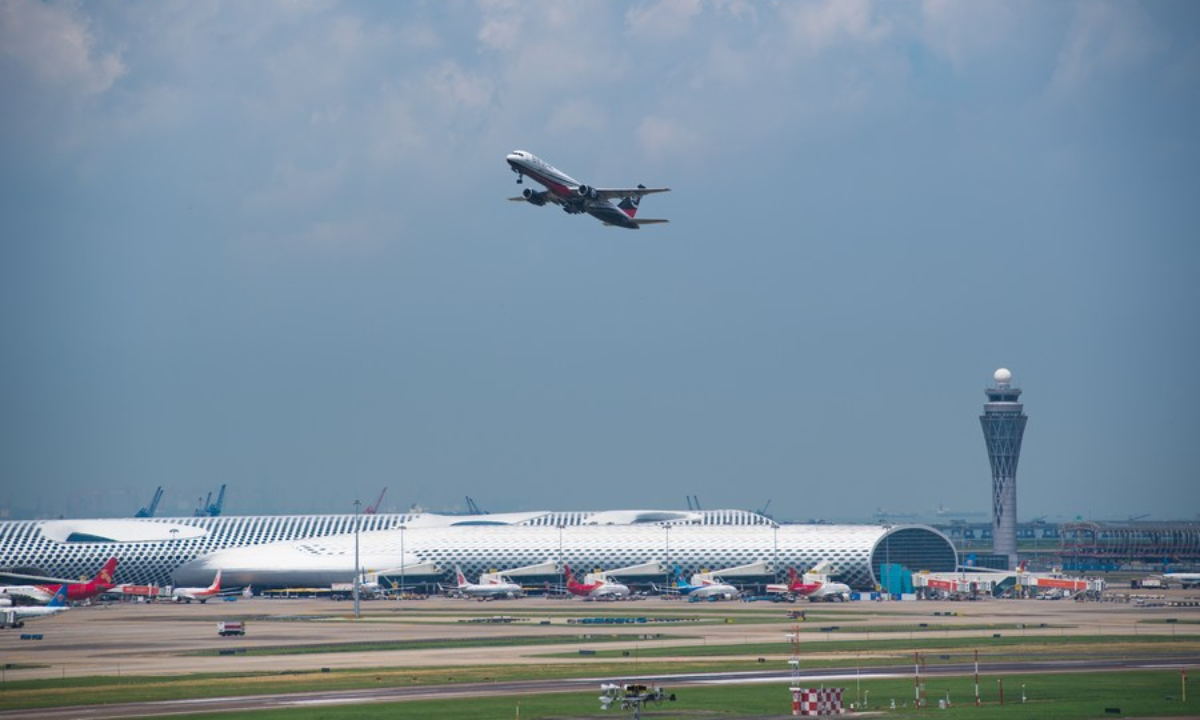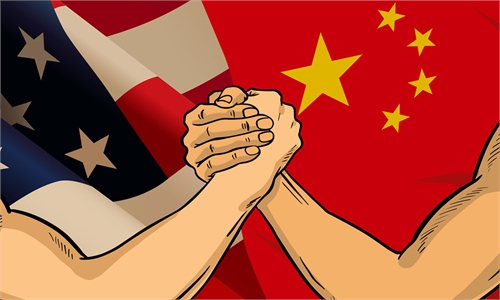Airlines announce more direct flights between China, US ahead of APEC summit
Exchanges show great potential of bilateral trade cooperation

A plane of SF Airlines Co., Ltd. takes off at Bao'an International Airport in Shenzhen, south China's Guangdong Province, Sep 10, 2020. Photo:Xinhua
Air China, China's flag carrier, announced on Monday that it will resume flights between Beijing and Washington and increase the number of weekly flights between Beijing and Los Angeles, ahead of the meeting between the top leaders of the two countries and the 30th Asia-Pacific Economic Cooperation (APEC) Economic Leaders' Meeting this week.
Flights between Beijing Capital International Airport and Washington Dulles International Airport in the US will resume on November 21, operating twice a week.
The airline also plans to increase the number of flights between Beijing and Los Angeles to three a week from November 30.
On the same day, Bloomberg reported that the Chinese government is considering unveiling a commitment for Boeing's 737 jetliner during the APEC summit, as a signal of a recent thaw between the two nations, said people familiar with the matter who aren't authorized to speak publicly. Terms of a potential agreement are still under discussion, they said.
Mao Ning, a spokesperson of China's Foreign Ministry, told the press conference on Monday that related information can be confirmed with the Chinese authorities.
Zhang Monan, a deputy director of the Institute of American and European studies at the China Centre for International Economic Exchanges in Beijing, told the Global Times on Monday that the recent disclosures of deals, exchanges and communications showed the great potential of trade and economic cooperation between the two countries.
"Such exchanges are good for both countries as the trade and economic relationships of the two countries are of a win-win nature," Zhang said.
More flights have been announced by airlines of both countries amid stabilizing bilateral ties.
On Saturday, US-based United Airlines officially resumed direct flights from Beijing to San Francisco.
On Thursday, Hainan Airlines said that it plans to resume direct flights from Beijing to Boston starting from November 26 with the return leg making a stopover in Seattle. Chinese airlines including Beijing Capital Airlines and China Eastern Airlines are also considering an increase in flight numbers.
Hu Qimu, a deputy secretary-general of the digital-real economies integration Forum 50, said that increasing flights will promote people-to-people exchanges, which will further enhance mutual understanding and trust.
In October, the US Department of Transportation (USDOT) said that Chinese airlines could fly 35 weekly round-trip flights after November 9, up from 24. That means there will be 70 weekly round-trip flights based on a reciprocal approach.
In May, the USDOT announced that it would allow Chinese airlines to operate 12 round-trip flights from the previous eight, and then announced in August that it would allow the number of Chinese passenger flights to the US to be increased to 18 per week, and from October 29 to 24 round-trip flights per week.
After US Secretary of State Antony Blinken's June trip to the China, consistent engagement by the USDOT and the State Department with Chinese officials "made this important step forward possible," USDOT said in August.
For its part, the Chinese Embassy in Washington said that "direct flights are vital to increasing visits between the people of China and the US, and we hope that the resumption of more flights will benefit the movement of people and trade between the two countries."
The increased flights came as high-level interactions are on the increase, and bilateral economic and trade relations have shown positive signs toward stabilizing.
In August, China announced a third round of resumption of outbound group tour services, including the US, Japan, South Korea, Australia, India and most European countries.
During the 6th China International Import Expo this year, more than 200 US exhibitors in the fields of semiconductors, medical devices, new-energy vehicles, cosmetics and other sectors attended, the largest US presence at the expo so far. The US Department of Agriculture also set up a pavilion at the expo for the first time.
Zhang said that China and the US may achieve more outcomes in non-core areas with more results of cooperation likely to be seen in climate, agriculture and even energy.
Hu agreed, noting that enhancing collaboration with China can help the US alleviate domestic inflation while China provides a vast investment market for the US.
"In addition, closer China-US trade and economic ties will benefit regional cooperation and help address current global uncertainties," Hu told the Global Times.


